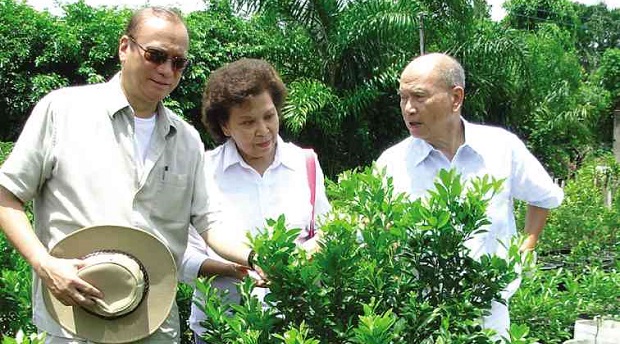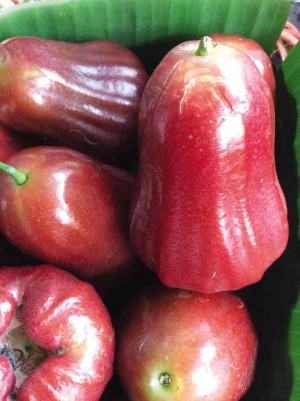Kalamansi, makopa, kamote get an upgrade

MAGSAYSAY and his sister Mila M. Valenzuela listen to Vergara explain why Luz kalamansi is better than the typical Filipino variety. Photo by Linda B. Bolido
New, better and more commercially viable fruit and vegetable planting materials are being developed and made available to farmers by a group of individuals and organizations committed to help make agriculture more financially rewarding.
National Scientist Dr. Benito S. Vergara has turned his own Exotica garden in Los Baños, Laguna, already a veritable miniature botanical showcase with his impressive plant collection, into an outdoor laboratory where he tests the suitability and viability of hybrid, marcotted, grafted and generally improved varieties of household essential kalamansi, banana that seems like a cross between saba and latundan, familiar but unappreciated makopa and kamote, as well as new and potentially marketable plants like the Bactris crassipes (peach palm) and key lime (dayap).
The project was spearheaded by Ramon Magsaysay, Jr. when he was still in the Senate. The former senator provided initial financial support and remains an ardent supporter of the initiative.
The project eventually evolved into a multi-sectoral endeavor, with the Mama Sita Foundation (MSF), Department of Agriculture-Bureau of Agricultural Research (DA-BAR) and the Philippine Council for Agriculture, Aquatic and Natural Resources Research and Development (PCAARRD), a sectoral body under the Department of Science and Technology, getting on board.
Vergara, a noted expert on plant physiology (the study of the tasks and behavior of flora and of different physical and chemical processes), described the initiative: “This project is a different paradigm for researches funded by PCAARD and DA-BAR wherein the private sector is the project implementer. R&D (research and development) projects funded by these agencies are [usually] implemented by government R&D institutions like public colleges and universities.”
Article continues after this advertisementWorking on an initial budget of P3 million when he started in 2006, the national scientist recognized he had one big disadvantage in taking on the challenge of developing crops with potential for industrial production.
Article continues after this advertisement
STAR Ruby makopa is bigger, sweeter and crunchier than its local counterpart. Photo by Linda B. Bolido
Until his retirement from the International Rice Research Institute, he was primarily a rice scientist, who cultivated orchids and ornamentals only as a hobby.
But he also realized he had some distinct advantages over other researchers.
“Plant breeders at the university (University of the Philippines Los Baños) and other agricultural research institutes deal mainly with short-duration crops, such as vegetables and cereals. One can develop an early-bearing cultivar like rice in five years… But breeding or selecting a better variety of coconut and other tree crops will need more than five years to evaluate and the researcher will be unable to produce a research paper, important for those wanting to be published or get promoted.”
With the help of Bart Lapuz of MSF, Vergara chose what kind of crops to evaluate for introduction into the Philippine market.
The almost one-man effort, although not lacking in support and exuberant cheers from friends and colleagues, has, so far, produced planting materials of Luz kalamansi, Bactris crassipes, Mama Sita banana, Star Ruby or Mama Sita makopa and ever-bearing Florida key lime.
Vergara said they wanted to provide farmers crops with greater growth potential and those that would enable them to dictate the price.
The plants are also suitable for non-commercial growers who want fruit-bearing varieties in their gardens.
The Luz kalamansi is named after the late former First Lady and mother of Magsaysay.
Of Thai origin, it has few, sometimes even no, seeds thus producing 20 percent more juice. It can be easily propagated by marcotting.
The bactris or peach palm, which came from Costa Rica, can substitute for coconut ubod. It has a major advantage over the coconut—harvesting the “heart” does not kill the plant as several suckers readily replace the cut. Vergara said, “In fact, the ubod should be harvested to produce more suckers.”
The Mama Sita banana, another import from Thailand, is dwarf and better able to withstand strong winds like those brought by typhoons. It also matures faster than local varieties.
The Thai Star Ruby makopa, unlike its local and blander counterpart, is sweet and crunchy.
The ever-bearing Florida key lime, which, as the name suggests, comes from the United States, seems to adapt well to Philippine conditions.
The rind is thinner so the fruit yields more juice.
As palatability would be a major consideration in enhancing these crops’ marketability, Vergara enlisted the help of Nani Labrador of the famed Nonesuch Restaurant and who made the old cafeteria of the Ramon Magsaysay Center a popular destination for gourmets and gourmands, to whip up dishes and products using the various crops.
Labrador now uses some of the produce for her Castillejos Farms products.
The full-grown “laboratory” plants have since moved to bigger pieces of land, many of them to the Mama Sita farms.
But cultivars or planting materials can still be bought through the Exotica garden.
Buyers may even ask for a few cuttings of “Zacamote,” a fast-growing kamote named after journalist and Ramon Magsaysay Award winner Zac Sarian, who brought the cultivar from Taiwan.
The lush plant is grown for its leaves rather than its roots.
Vergara also tried, and is still testing, several other plants in his “laboratory,” some of which, he said, will need a much more elaborate setup than what he has at Exotica.
Farmers can hardly wait.
E-mail Vergara at bsvergara@gmail.com for information on the various plants he is propagating in his garden.